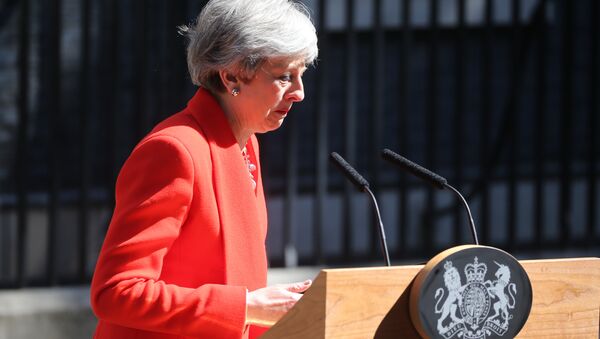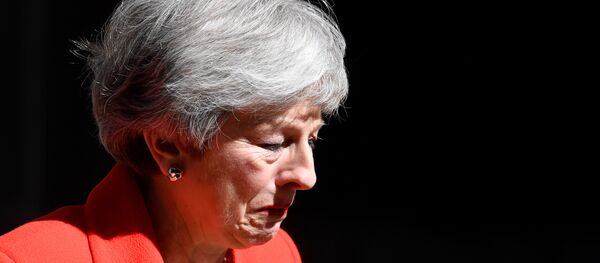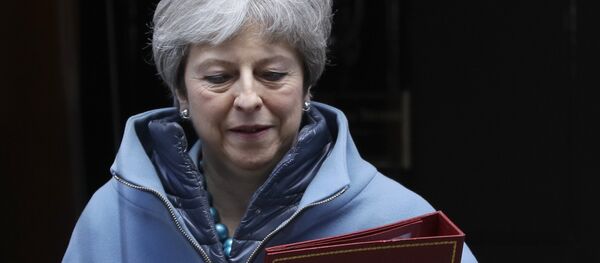Theresa May, who has headed the British Cabinet since 2016 and was expected to lead the country though the whole Brexit process, a hot-button political issue in the UK, Friday announced her resignation to a crowd gathered in Downing Street.
A host of prominent political figures were quick to respond to Theresa May’s resignation announcement on Friday morning, which came after a meeting with Graham Brady, the chair of the Tory 1922 Committee. Some Tory backbenchers and even many of her own cabinet earlier voiced a readiness to set up a second vote of no confidence in her leadership after she struggled to survive the first one last December.
• Former Premier David Cameron, who was Brexit’s first political casualty, has tweeted saying he hoped “the spirit of compromise is continued”, and praising May’s “brave speech”:
Strong and brave speech by a Prime Minister driven by duty and service… she should be thanked for her tireless efforts on behalf of the country. Full statement below. pic.twitter.com/4XpEZIzrxh
— David Cameron (@David_Cameron) 24 мая 2019 г.
David Cameron, who quit his former role hours after the results of the 2016 referendum were confirmed, stressed his colleague had “made the right decision”, however “painful it is to accept that your time is up”.
• Hardline Brexiteer Jacob Rees-Mogg, a longstanding critic of Theresa May's, has also responded to her resignation, which notably coincided with his 50th birthday. He urged the Conservatives to move on and ultimately deliver the UK’s divorce from the EU:
‘Nothing in office became her like the leaving it’ An unquestionably dutiful person left with dignity and the Conservatives must now get on and deliver Brexit.
— Jacob Rees-Mogg (@Jacob_Rees_Mogg) 24 мая 2019 г.
• Nigel Farage, leader of the Brexit Party and politician who has been pushing hard to make Britain leave the European Union, said the Conservatives must elect an anti-EU leader. Bringing up the “two pro-EU Tory leaders now gone” he urged the party to finally learn their lesson:
It is difficult not to feel for Mrs May, but politically she misjudged the mood of the country and her party. Two Tory leaders have now gone whose instincts were pro-EU. Either the party learns that lesson or it dies.
— Nigel Farage (@Nigel_Farage) 24 мая 2019 г.
• Meanwhile, Jean-Claude Juncker, the President of the European Commission, followed Theresa May's resignation announcement "without personal joy”, according to his spokeswoman.
“The president very much liked and appreciated working with Prime Minister May, and has said before Theresa May is a woman of courage for whom he has great respect”, the spokeswoman added stressing that he will “equally respect and establish working relations with any head of the government, whomever they may be, without stopping his conversations with Prime Minister May”.
• Jeremy Corbyn was, in the meantime, one of the first politicians to have his say on May’s emotional address, unequivocally stating that the prime minister was right to finally call it a day.
"She's now accepted what the country's known for months: she can't govern, and nor can her divided and disintegrating party”, calling for her replacement to set up a prompt election. In his lengthy Facebook post, he addressed “the burning injustices” that grew “even starker” during May’s term, stating that the Conservatives virtually botched both Brexit and the whole country being “unable to deal with people’s pressing needs”.
• Boris Johnson, the former foreign secretary who is widely believed to stand the biggest chance of replacing May as prime minister, said it is time to follow her “urgings” and join efforts to deliver Brexit. His leadership ambitions have been in the spotlight recently, however he unexpectedly chose to pull out of the last leadership race, which was ultimately won by May.
The leadership of an array of European countries also issued official comments, with German Chancellor Angela Merkel treating May’s decision “with respect”, according to a German government spokesperson.
• The Kremlin also issued a statement saying Theresa May led her country at a difficult period for its ties with Russia.
“Mrs May’s premiership came during a very difficult period in our bilateral relations”, Kremlin spokesman Dmitry Peskov commented.
• Dutch Prime Minister Mark Rutte said that he had spoken to May to express his thanks and respect about her announcement. He tweeted that the "the deal reached between the European Union and Britain for an orderly Brexit remains on the table."
• French President Emmanuel Macron, for his part, called for “rapid clarification” about the country’s position and expectations from Brexit. According to a statement released by the Elysee Palace, Macron expressed readiness to work with a new prime minister, while emphasising that "the principles of the EU will continue to apply, with the priority on the smooth functioning of the EU”.
• A less positive outlook has been voiced by Irish Prime Minister Leo Varadkar, who warned that the election of a new prime minister in Britain may lead to a new phase in Brexit talks that could be "very dangerous" for his nation.
"We may see the election of a Eurosceptic prime minister who wants to repudiate the withdrawal agreement and go for no deal or we may even see a new British government that wants to see a closer relationship with the EU and goes for a second referendum”, Varadkar told Ireland's Virgin Media News, adding, though that whatever happens, they “will hold their nerve” to “build our alliances across the European Union” in order to lead Ireland “through this”.
• US President Donald Trump praised Theresa May after her resignation as prime minister. Speaking to journalists, Donald Trump said that he felt bad for Theresa May.
"I feel badly for Theresa — I like her very much. She's a good woman, she worked very hard, she's very strong. She decided to do something that some people were surprised at, some people weren't. It's for the good of her country," Trump said.
READ MORE: Disaster in Downing Street: What Has Theresa May Achieved in 1,047 Days?
May’s resignation come at almost the same time that US President Donald Trump picked to make his first state visit to the UK. He is due to arrive on 3 June, thereby accepting May’s invitation that she made while visiting POTUS in Washington right after his inauguration in 2016.
After Theresa May successfully survived a no-confidence vote in December, she was widely believed to have secured an unchallenged stay in the top post for another year. Yet, she came under severe pressure both from lawmakers, and her own party members amid her inability to agree on a common stance over the Brexit withdrawal agreement she had negotiated with the EU.




